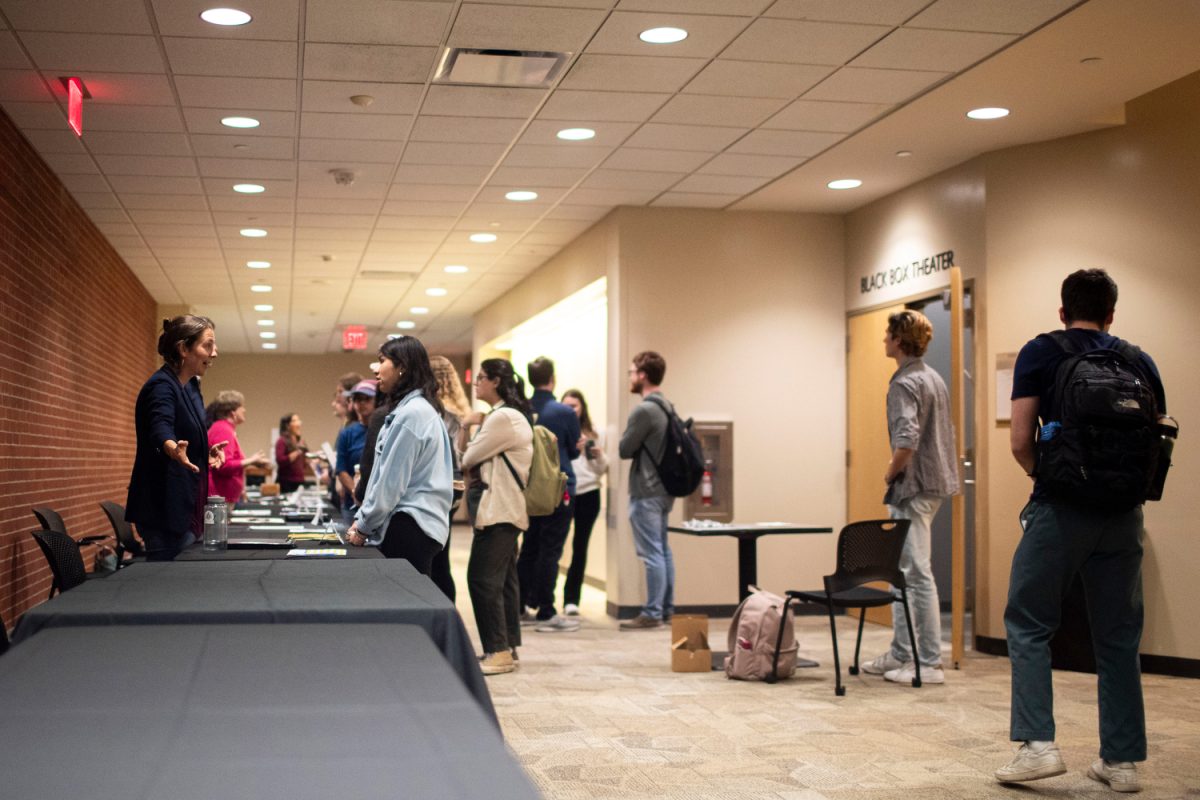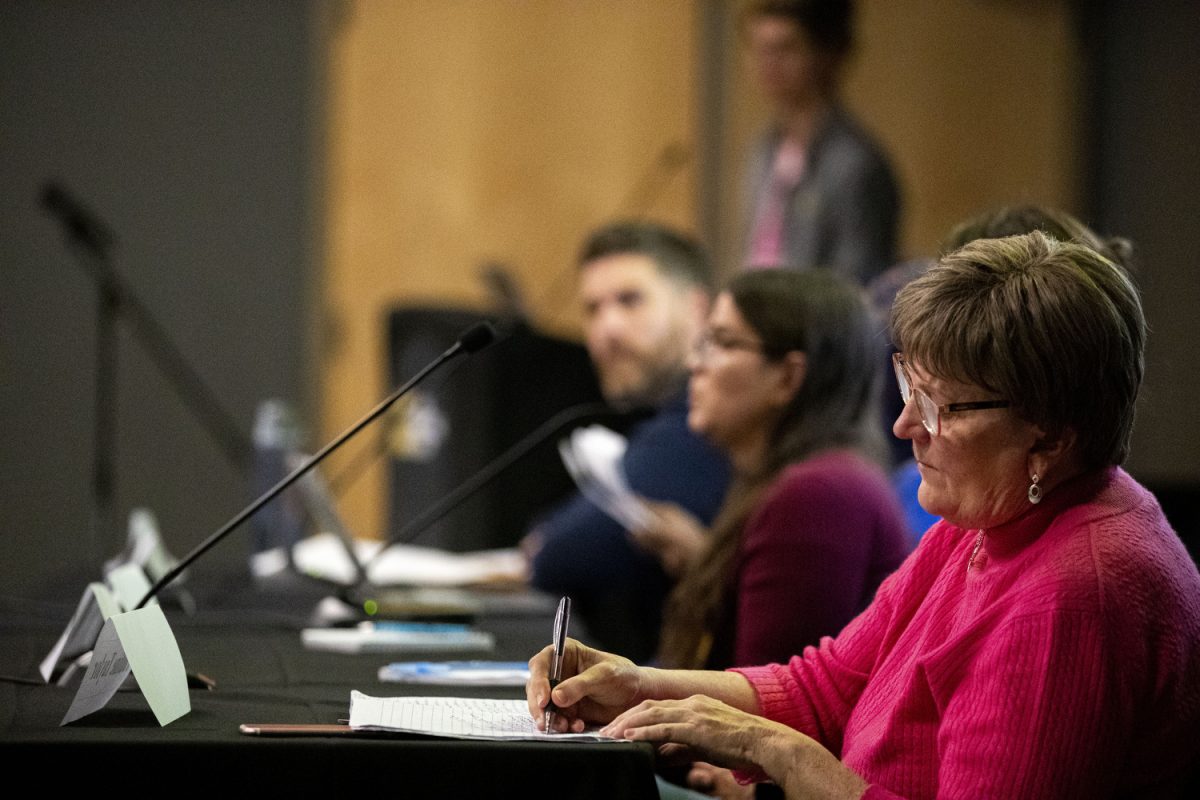University of Iowa students and five candidates for city council gathered in the Iowa Memorial Union Monday night and spoke about topics from housing affordability to student voter turnout.
The meet and greet, with about 30 people in attendance, was hosted by Undergraduate Student Government. The event comes two weeks ahead of the election for city council on Nov. 7 in which six candidates will vie for a seat on the council. According to the Johnson County Auditor’s website, there are six candidates running for four possible seats.
In attendance were current incumbents Laura Bergus and Pauline Taylor; architect Josh Moe; Founder and Executive Director of Corridor Community Action Network Mandi Remington; and former Executive Director of Center for Worker Justice Mazahir Salih.
Taylor and Bergus are both running for the District A seat, which had a primary on Oct. 10 that eliminated the third candidate for the seat, Tim Borchardt, who was also running. The two incumbents won the primary, with Bergus winning 372 of the vote and Taylor winning 159.
There are two at-large seats up for grabs and being contested by Moe, Salih, and Remington. Salih previously served on the city council in an at-large seat, the first Sudanese-American woman to be elected to public office in the U.S., and was Mayor Pro Tem from 2020-21.
Not in attendance for the event but also running was Andrew Dunn, the freshman councilor who was elected earlier this year in a special election to replace the outgoing Janice Weiner. Dunn is running uncontested for the District C seat, up for grabs after incumbent John Thomas announced his retirement in April.
Before its beginning, the candidates had an opportunity to set up a small display on tables outside the Black Box theater. During this time, candidates mingled with students in attendance, handing out campaign items like stickers and pamphlets.
Everyone eventually moved into the theater, with each candidate giving a short speech touching on their main talking points, as well as their background.
A common talking point among the group was the importance of engaging student voters, with some candidates noting that local elections tend to see a lower turnout from younger demographics. As such, they were appreciative of USG for setting up the event and for the crowd of roughly 30 students in the theater for attending.
The candidates would then participate in a question and answer, taking turns fielding questions submitted by the students in attendance. Two questions posed to candidates covered housing and homelessness in Iowa City.
Affordable housing was a common talking point among the candidates, each sharing their visions of how to tackle the issue in Iowa City.
Moe said Iowa City is experiencing a shortage of housing construction, falling to the lowest level of residential lot creation in over 30 years. Moe said the solution is to be creative, including offering a variety of housing choices and increasing the amount of commercial hubs.
“People experience homelessness for a wide variety of reasons, and addressing those why’s or somebody else’s brought up was really important,” Moe said. “Iowa City has an amazing ecosystem of nonprofits that address the specific needs of different populations who experience homelessness differently.”
Remington spoke about accessibility and barriers residents face, including increasing accessibility to the civic system and investing in community organizations.
Bergus and Taylor referenced the city council’s Housing First project, Taylor touching on alternative housing options such as duplexes and tiny homes.

In regards to climate action initiatives, Bergus and Taylor again referenced current city council policies.
Bergus said she is proud to have created an accelerated climate action plan, a group of staff dedicated to the plan, and a levy that collects real estate taxes for the purpose of supporting climate action initiatives in Iowa City.
Salih spoke about the importance of education regarding climate change as many people do not know how they can make a difference.
Moe said his perspective differed because of his work as a city consultant. He wants to add to the existing climate action plan by implementing a policy to decarbonize buildings.
In the audience were UI second-year graduate students Melanie Comer and Kaylynn Sieverding.
“It’s great to hear that they’re open to all of these ideas that create higher access accessibility for our low-income population and our student population, but I actually want to see how they’re going to do that,” Sieverding. “I don’t want to just hear it, I want to see it happen.”
RELATED: Incumbents Laura Bergus and Pauline Taylor win Iowa City’s District A primary
Comer said events like the meet and greet open her eyes to new issues and humanize the candidates.
Candidates spoke on the importance of events like the one on Tuesday night with The Daily Iowan before and after the event and also touched on engaging student voters.
The candidates said they were excited to speak with students, and encouraged students to go out to vote, noting that local elections tend to see a lower turnout from younger demographics when compared to national elections.
This was reflected in the primary election on Oct. 10, in which a total of 649 people out of an eligible 9,860, or 6.58 percent, voted.
“I really, really hope that people understand how critically important it is to get out and vote to protect democracy, honestly,” Bergus said. “When I was elected in 2018, there was less than 12 percent of registered voters participated in that election — we have to do better than that.”



